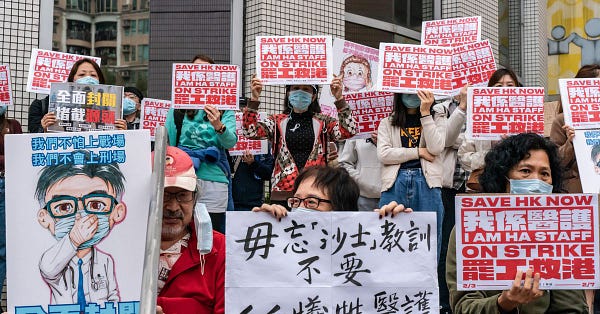The China Letter: February 12, 2020
COVID-19 vs. the internet


Friends and family of 34-year-old Chen Qiushi fear that he may have been forcibly quarantined by the government after he posted videos and messages that criticized hardship in Wuhan due to what’s been formally called COVID-19. The Committee to Protect Journalists called on authorities to reveal his whereabouts, to no avail.


China under quarantine in 2020 includes drones flying over rural areas to prevent local residents from going outside without wearing masks. Meanwhile, a grip on internet censorship has tightened across the country, following a respite from January 19 to February 1. But the death of whistleblowing coronavirus doctor Li Wenliang has sparked new demands for freedom of speech.
Outbreak stoking protests
Hong Kong chief executive Carrie Lam is fielding much of the fury in regard to issues like a health care system that risks being overwhelmed by borders that aren’t sealed off with mainland China. That’s combined with outrage over issues like a rumoured toilet paper shortage in HK, which was possibly misinformation from Beijing.


“Battle for Hong Kong,” the latest hour-long episode of PBS’s Frontline, looks at the evolution of the pro-democracy movement from the ground. And that comes with an updated postscript about how a growing number of confirmed cases of coronavirus roused the striking medical workers, which was followed by a new wave of protesters.
Fuzzy facts of Equifax
“China is also a victim of this,” said its foreign ministry spokesman Geng Shuang about the massive 2017 Equifax data breach, for which four members of the Chinese military were charged by the U.S. Department of Justice. The indictment nonetheless followed a pattern of American data being collected as part of an agenda:


The challenge spies and counter-spies have in front of them will only grow more daunting as biometric identifiers—fingerprints, facial recognition scans, and DNA tests—continue to become more common in daily life. It’s clear that the U.S. government is already thinking about preventing and limiting its exposure to rich data troves, like Equifax, in the future: The Pentagon recently asked military personnel to stop using at-home DNA kits for health and ancestry purposes, fearful about where that unchangeable, unalterable genetic data may end up now or later.
Remission from a scandal
A recent investigation into Tampa, Florida cancer researchers who were being paid by China—which led to several dismissals—has been followed by the Moffitt Cancer Center returning $1 million to the state, while it asks for $400 million from cigarette taxes:


Moffitt was the focus of a probe into how the doctors got paid through the Thousand Talents Program, without disclosing their associations with China. Harvard professor Charles Lieber was also recently arrested and charged for lying about similar income.
Sizing up the spectrum
China’s ambassador to the U.K., Liu Xiaoming, thinks that Conservative politicians opposed to Huawei’s role in the 5G network are conducting “a witch hunt.” Meanwhile in Canada, it’s a slim overall majority that appears to be opposed:


Canada’s military has made up its mind: it believes Huawei access to 5G would threaten national security, and should fall in line with the U.S., Australia and New Zealand by banning them. But the U.K. opted to give the Chinese company a limited role.
The last words, for now
The Farewell, an American comedy-drama primarily shot in Changchun, China, flopped with moviegoers in the country where it was filmed. It also failed to garner nominations at the Academy Awards, where South Korean production Parasite prevailed. But it won the big feature prize at the scrappy anti-Oscars:









